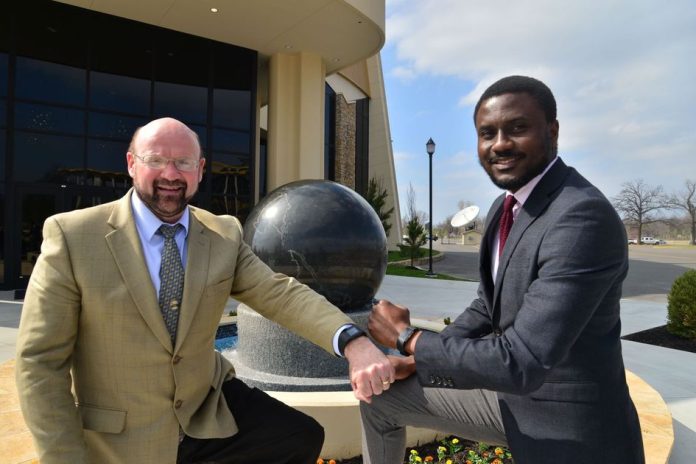
University’s successful student fitness program ‘is ahead of the curve’
Fitbits are a good fit at Oral Roberts University, and among millennials, says the man who launched the project that put the popular fitness data recording devices on the wrists of virtually all incoming ORU students.
A few media outlets around the nation poked fun at it, he said, but the vast majority, including the New York Times and USA Today, were “fair, or above.”
And now, he said, more than 70 major American companies have initiated similar programs, suggesting that ORU “is ahead of the curve with electronic devices to help students succeed.”
Since its founding, ORU has required students to participate in health and fitness activities as part of its whole-person philosophy — developing the body, mind and spirit. Until recently, all students tracked their fitness activities on paper and turned those papers in for part of their grade.
Under the new program, students’ steps and heart rate are monitored by the Fitbits all day every day, and that data goes directly into a computer program that interfaces with the school’s grading system.
Mathews said the program frees students from keeping track of their required fitness activities and frees faculty members from the time-consuming chore of entering that data into the grading system.
And it’s far more precise than the earlier paper system.
He knows, for example, that since the program began, Fitbit-wearing students on campus have taken 3,000,277,574 steps, enough for three round trips to the moon.
Jon Anderson, who programmed the system, said that it records not only number of steps students take, but how many minutes each week they have an elevated heart rate.
The goal is 10,000 steps a day, and 150 minutes per week of exercise resulting in an elevated heart rate.
The program started in the fall of 2015 with incoming freshman and transfer students, and this school year includes those freshmen, who are now sophomores, and new freshmen. This semester at ORU, 1,265 students are wearing Fitbits.
In four years, all students will be on the program.
Mathew said that while the health and physical fitness requirements at ORU are mandatory, the use of the Fitbit is not.
But millennials are health conscious and comfortable with digital devices, he said, and he knows of no students who have chosen to use the old paper monitoring system instead.
Jesupelumi Wickliffe, a graduate student from Nigeria, said he thought the program was “very beneficial.”
“Millennials are going for healthy lifestyles, … and ORU is leveraging that.”
If he was in Nigeria, and not on campus, he would still be able to fully utilize the Fitbit program, which accesses the ORU computer via the internet, he said.
A recent Goldman Sachs report said studies show millennials devote more time and money to exercise and eating right than earlier generations. And they like to use apps to track training data.
Mathews said that 90 years ago, nearly all colleges had physical education requirements, but that by 1965, that had dropped to under 10 percent.
He said the ORU recently was ranked one of the safest campuses in the nation, and in the top five healthiest.
“The number one school least likely to party in the nation is ORU. They poke fun at it a little bit … but we’re not ashamed of that,” he said.
Source: Tulsa World



